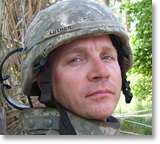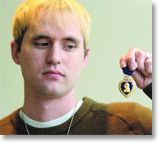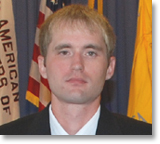
 |
|
Stopping Seizures Before They Occur
In 2003, while studying at Columbia Journalism School, I produced an article on epilepsy spotlighting my struggles with the condition — and the groundbreaking treatment that helped me get well.
In 2021, at last, I've transformed my reporting into a brief video for patients and families struggling with epilepsy.
The video, "Stopping Seizures Before They Occur," explores innovative research conducted by psychologist Donna Andrews and neurologist Joel Reiter and lays out the techniques they developed that changed my life.  |
| |
 |
| |
 |
|
The
Talking Treatment
This
article is a first-person look at my struggles with epilepsy
and the innovative medical research that helped me get
well.
This
research and the treatment techniques derived from it, developed
by psychologist Donna Andrews and Harvard-trained neurologist
Joel Reiter, have led to critical discoveries about the nature
of epilepsy which have yet to reach the public.
The
product of several years of research and reporting in my own
right, this article served as my master's thesis for the Columbia
School of Journalism.  |
| |
 |
| |
 |
|
Disposable Soldiers
Part 3 in my series on Personality Disorder discharges follows the remarkable story of Sgt. Chuck Luther, who served in Iraq and won 22 honors before being wounded by mortar fire. The explosion left Luther with severe vision and hearing loss.
Army doctors told Luther his blindness and deafness were caused by a personality disorder. The sergeant was then tortured by Army officials: confined to a closet for over a month, under enforced sleep deprivation, until he agreed to sign fraudulent documents saying he suffered from a pre-existing personality disorder, thereby forfeiting all disability and medical benefits.
Luther's ordeal sparked outrage from Washington officials and the public and led to a large-scale effort, driven by readers, to halt PD discharges.  |
| |
 |
| |
 |
|
What Happened to Sgt. Jimenez
Sgt. Juan Jimenez returned from Iraq with two Purple Hearts and a host of medical problems. Jimenez had been struck by two roadside bombs. The brain damage from those blows left him with seizures and severe headaches.
But when the sergeant approached the V.A. for disability benefits, his claim was rejected. Stunned and angry, Jimenez decided to fight back. He joined with other wounded veterans and sued the government.
The landmark case forced top Washington officials onto the witness stand to defend the V.A.'s treatment of ill and injured soldiers.  |
| |
 |
| |
 |
|
Thanks for Nothing
This profile of Specialist Jon Town set off a firestorm when it was published April 2007.
While serving in Ramadi, Iraq, Town was knocked unconscious by a 107-milimeter rocket. Though the blast left him with significant hearing loss, he was denied disability benefits after the Army claimed his symptoms came from a pre-existing personality disorder.
The article spurred 31 senators to call for an investigation and led to Congressional hearings in July 2007.  |
| |
 |
| |
 |
|
Taking His Case to Washington
In Part II of my personality disorder series, Specialist Jon Town heads to Washington, where he tells a Congressional committee how he won the Purple Heart and was then denied disability and medical benefits.
We hear from Senator Kit Bond, Congressman Bob Filner, rock icon Dave Matthews and others who have reached out to the wounded soldier.
The
article also includes interviews with Army doctors who say wounded soldiers are routinely misdiagnosed.  |
| |
 |
| |
 |
|
Miracle
or Science?
In
the weird world of Utah, the line between miracle and science
can indeed be a thin one. Certainly it was natural to ask
that question after meeting Brooke and Bree Hansen, two identical
twins as far as their friends and neighbors knew.
Only,
as it turns out, Brooke and Bree are of no genetic relation
whatsoever. What are the chances, then, that the two girls
would look identical?
"We're
talking about one out of all the grains of sand on all the
beaches in the world," said Professor Terry Schwaner, an expert
in population genetics.  |
| |
 |
| |
 |
|
Stem-Cell
Research & Senator Hatch
This
portrait of a Utah family suffering from Parkinson's disease
and looking for help from stem-cell research struck a real
chord with local readers, many of whom had Parkinson's in
their family and had been debating themselves about the scientific
and moral/religious implications of stem-cell research.
This
article features my interview with Sen. Orrin Hatch (R-UT),
who had just made a bold - and, within Utah, quite controversial
- stand in favor of the research.  |
| |

|